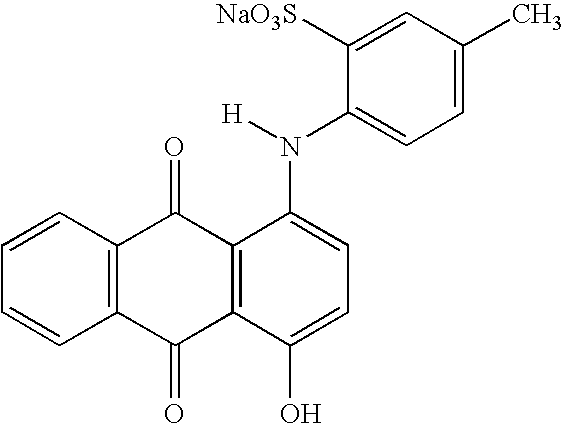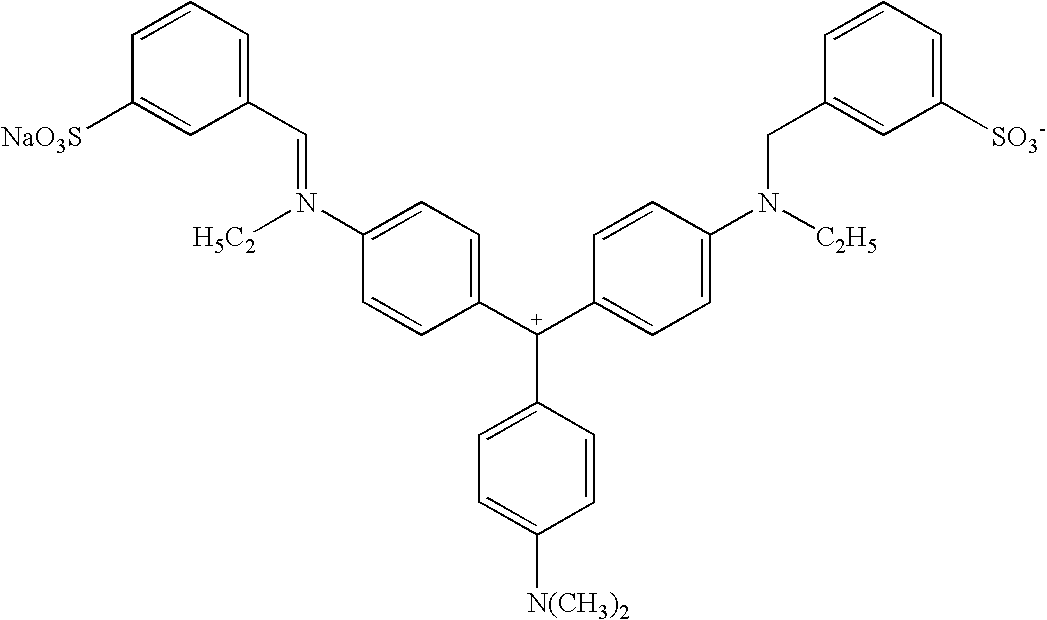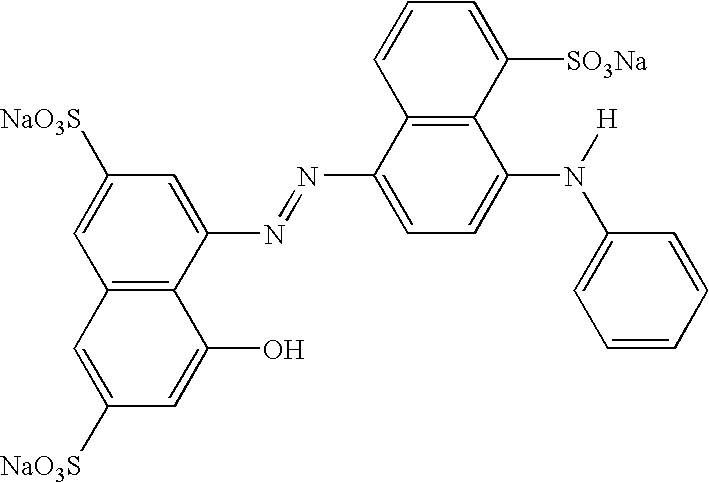Fabric care compositions comprising hueing dye
a technology of dyeing dye and fabric care composition, applied in detergent dyes, liquid soaps, detergent compounding agents, etc., can solve the problems of fabric to look older and worn, fabric discoloration from the original fabric color, and fabric to look yellowing, so as to reduce the staining potential score of a fabric conditioning composition
- Summary
- Abstract
- Description
- Claims
- Application Information
AI Technical Summary
Benefits of technology
Problems solved by technology
Method used
Image
Examples
examples
[0128]The following are non-limiting examples of the fabric conditioning compositions of the present invention.
[0129]
EXAMPLESINGREDIENTSIIIIIIIVVVIVIIFabric Softening Activea14.00%13.70%13.70%13.70%13.70%4.67%4.67%Ethanol 2.28% 2.14% 2.14% 2.14% 2.14%0.76%0.76%Cationic Starchb 2.00% 2.17% 2.17% 2.17% 2.17%0.67%0.67%Perfume 1.58% 1.45% 1.45% 1.45% 1.45%0.50%0.50%Phase Stabilizing Polymerc 0.25% 0.21% 0.21% 0.21% 0.21%——Calcium Chloride0.300%0.147%0.147%0.147%0.147%——DTPAd0.005%0.007%0.007%0.007%0.007%0.003% 0.003% Preservativee7.5 ppm 5 ppm 5 ppm 5 ppm 5 ppm7.5 ppm 7.5 ppm Antifoamf0.011%0.015%0.015%0.015%0.015%0.011%0.011% Acid Violet #4930 ppm——Liquitint Violet CTg 30 ppm 30 ppm30 ppm60 ppmLiquitint Violet LSh—150 ppm150 ppm60 ppmMilliken Violet 28Bi90 ppm90 ppmTinopal CBS-Xj0.4 0.2 0.2 0.2 0.2 0.130.13Ethoquad C / 25k0.520.261.040.261.041.040.52Ammonium Chloride 0.1% 0.1% 0.1% 0.1% 0.1%——Hydrochloric Acid0.012%0.012%0.012%0.012%0.012%0.0004% 0.0004% Deionized WaterBalanceBalanceBal...
example viii
Cationic Starch Admixed with Fabric Softening Active
[0131]To make a composition of the present invention with cationic starch dry powder admixed with the fabric softening active, approximately 25% of the fabric softening raw material containing the active (e.g. N,N-di(tallowoyl-oxyethyl)-N,N-dimethylammonium chloride) and ethanol is premixed with the entire desired amount of cationic starch, such as National 49–3490, then heated to 70–75° C. to fluidize the material. The remaining 75% of the fabric softening raw material is also heated to 70–75° C. to fluidize this portion. The fluidized fabric softening raw material and cationic starch mix is then combined with the remaining fluidized fabric softening raw material. Deionized water, antifoam agent (DC2310), hydrochloric acid, and a preservative (KATHON® CG) are mixed to form a water seat, and this mixture is heated to 70–75° C. The hot mixture of cationic starch and fabric softening active is pumped into the hot water seat. Both mix...
example ix
Gelatinized Cationic Starch Components Added into the Water
[0132]To make a composition of the present invention with gelatinized cationic starch components added into the water, the cationic starch dry powder is added to the desired amount of deionized water and cooked past the pasting temperature to a polymeric dispersion of the starch components. The remaining amount of deionized water, antifoam agent (DC2310), hydrochloric acid, and a preservative (KATHON® CG) are mixed to form a water seat, and this mixture is heated to 70–75° C. The starch component dispersion, which is kept hot following gelatinization, is added to the heated water seat. Not wishing to be bound by theory, adding the cationic starch to the water seat prior to adding the fabric softening active may allow the cationic starch to disperse more homogeneously in the water phase. A fabric softening raw material containing the active (e.g. N,N-di(tallowoyl-oxyethyl)-N,N-dimethylammonium chloride) and ethanol is heated ...
PUM
| Property | Measurement | Unit |
|---|---|---|
| diameter | aaaaa | aaaaa |
| Reflectance K/S | aaaaa | aaaaa |
| weight | aaaaa | aaaaa |
Abstract
Description
Claims
Application Information
 Login to View More
Login to View More - R&D
- Intellectual Property
- Life Sciences
- Materials
- Tech Scout
- Unparalleled Data Quality
- Higher Quality Content
- 60% Fewer Hallucinations
Browse by: Latest US Patents, China's latest patents, Technical Efficacy Thesaurus, Application Domain, Technology Topic, Popular Technical Reports.
© 2025 PatSnap. All rights reserved.Legal|Privacy policy|Modern Slavery Act Transparency Statement|Sitemap|About US| Contact US: help@patsnap.com



